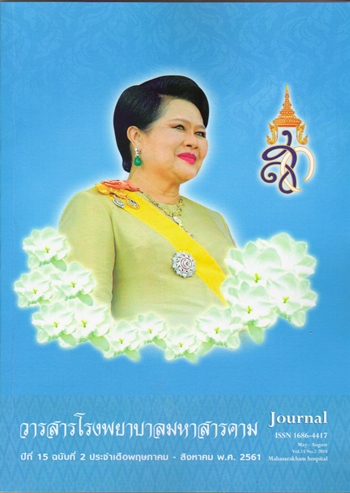การพยาบาลผู้ป่วยโรคหลอดเลือดสมองระยะฟื้นฟูสภาพ : กรณีศึกษา 2 ราย
บทคัดย่อ
วัตถุประสงค์: เพื่อศึกษาเปรียบเทียบข้อวินิจฉัยทางการพยาบาล วางแผน ปฏิบัติการพยาบาลประเมินผลลัพธ์ทางการพยาบาลและพัฒนาแนวทางการพยาบาลผู้ป่วยโรคหลอดเลือดสมองระยะฟื้นฟูสภาพ
วิธีการศึกษา: กรณีศึกษา 2 ราย เลือกแบบเจาะจงในผู้ป่วยโรคหลอดเลือดสมองระยะฟื้นฟูสภาพ เก็บรวบรวมข้อมูลจากเวชระเบียนผู้ป่วย จากผู้ป่วย และญาติ กำหนดข้อวินิจฉัยทางการพยาบาลโดยใช้แนวคิด 11 แบบแผนสุขภาพของกอร์ดอน วางแผนปฏิบัติการพยาบาลตามข้อวินิจฉัยทางการพยาบาล สรุปและประเมินผลลัพธ์ทางการพยาบาล
ผลการศึกษา: กรณีศึกษา 2 ราย เป็นผู้ป่วยโรคหลอดเลือดสมอง โดยกรณีที่ 1 เป็นผู้ป่วยชายไทยวัย 51 ปี อาการสำคัญหน้ามืด พูดคุยสับสน ก่อนมาโรงพยาบาล 30 นาทีได้รับการวินิจฉัย Right Basal Ganglia Hemorrhage กรณีที่ 2 ผู้ป่วยชายไทยวัย 62 ปี อาการสำคัญซึม แขนขาซ้ายอ่อนแรง ก่อนมาโรงพยาบาล 1 ชั่วโมงได้รับการวินิจฉัย Ischemic stroke with right subacute middle cerebral artery infarction subfalcine herniation to left ผู้ป่วยทั้ง 2 รายมีภาวะหลอดเลือดสมองแตกส่งผลให้ผู้ป่วยอ่อนแรงครึ่งซีก ผู้ป่วยได้รับการผ่าตัดสมองนำเลือดที่คั่งในสมองออก หลังผ่าตัดผู้ป่วยต้องใส่ท่อช่วยหายใจและเครื่องช่วยหายใจเป็นเวลานานทำให้เกิดภาวะแทรกซ้อนและต้องเจาะคอ พยาบาลต้องมีการเฝ้าระวังภาวะความดันในกะโหลกศีรษะสูงและมีการเฝ้าระวังป้องกันภาวะแทรกซ้อนต่างๆ ภายหลังเข้ารับการรักษาพยาบาลและฟื้นฟูสภาพสภาพอาการโดยรวมของผู้ป่วยดีขึ้นตามลำดับ
สรุป: ผู้ป่วยทั้ง 2 รายที่มีภาวะหลอดเลือดสมองแตกได้การดูแลระยะฟื้นฟูสภาพในโรงพยาบาล สภาพอาการโดยรวมดีขึ้นตามลำดับ การมีการวางแผนจำหน่ายตั้งแต่แรกรับ การติดตามผู้ป่วยอย่างต่อเนื่องและการเตรียมการเข้าสู่กระบวนการฟื้นฟูสภาพอย่างเป็นระบบจะส่งผลให้ผู้ป่วยมีคุณภาพชีวิตที่ดีต่อไป
คำสำคัญ: โรคหลอดเลือดสมอง, ระยะฟื้นฟูสภาพ, การพยาบาล
เอกสารอ้างอิง
Fang J, Yuan K, Gindi RM, Ward BW, Ayala C, Loustalot F. Association of Birthplace and Coronary Heart Disease and Stroke Among US Adults: National Health Interview Survey, 2006 to 2014. J Am Heart Assoc 2018 ;7(7).
Tian D, Yang Q, Dong Q, Li N, Yan B, Fan D. Trends in stroke subtypes and vascular risk factors in a stroke center in China over 10 years. Sci Rep 2018 ;8:5037.
Krishnamurthi RV, Barker-Collo S, Parag V, Parmar P, Witt E, Jones A, et al. Stroke Incidence by Major Pathological Type and Ischemic Subtypes in the Auckland Regional Community Stroke Studies: Changes Between 2002 and 2011. Stroke 2018;49:3–10.
WHO | The top 10 causes of death [Internet]. WHO. [cited 2018 Apr 5]. Available from: http://www.who.int/mediacentre/factsheets/fs310/en/
ThaiNCD.com. สำนักโรคไม่ติดต่อ กรมควบคุมโรค กระทรวงสาธารณสุข [Internet]. [cited 2018 Apr 5]. Available from: http://thaincd.com/2016/mission3
Kongbunkiat K, Kasemsap N, Thepsuthammarat K, Tiamkao S, Sawanyawisuth K. National data on stroke outcomes in Thailand. J Clin Neurosci Off J Neurosurg Soc Australas 2015 ;22:493–7.
Lee H-J, Choi E-K, Lee S-H, Kim Y-J, Han K-D, Oh S. Risk of ischemic stroke in metabolically healthy obesity: A nationwide population-based study. PloS One 2018;13:e0195210.
Teh WL, Abdin E, Vaingankar JA, Seow E, Sagayadevan V, Shafie S, et al. Prevalence of stroke, risk factors, disability and care needs in older adults in Singapore: results from the WiSE study. BMJ Open 2018;8:e020285.
Hakulinen C, Pulkki-Råback L, Virtanen M, Jokela M, Kivimäki M, Elovainio M. Social isolation and loneliness as risk factors for myocardial infarction, stroke and mortality: UK Biobank cohort study of 479 054 men and women. Heart Br Card Soc 2018; 123-56
Sorgun MH, Kuzu M, Ozer IS, Yilmaz V, Ulukan C, Cotur Levent H, et al. Risk Factors, Biomarkers, Etiology, Outcome and Prognosis of Ischemic Stroke in Cancer Patients. Asian Pac J Cancer Prev APJCP 2018 27;19:649–53.
van Valburg MK, Arbous MS, Georgieva M, Brealey DA, Singer M, Geerts BF. Clinical Predictors of Survival and Functional Outcome of Stroke Patients Admitted to Critical Care. Crit Care Med 2018 ; 167-78
Pavol MA, Bassile CC, Lehman JR, Harmon E, Ferreira N, Shinn B, et al. Modified Approach to Stroke Rehabilitation (MAStR): feasibility study of a method to apply procedural memory concepts to transfer training. Top Stroke Rehabil 2018 ;1–8.
Hong I, Karmarkar A, Chan W, Kuo Y-F, Mallinson T, Ottenbacher KJ, et al. Discharge Patterns for Ischemic and Hemorrhagic Stroke Patients Going from Acute Care Hospitals to Inpatient and Skilled Nursing Rehabilitation. Am J Phys Med Rehabil 2018; 190-200
Wang H, Sandel ME, Terdiman J, Armstrong MA, Klatsky A, Camicia M, et al. Postacute care and ischemic stroke mortality: findings from an integrated health care system in northern California PM R. 2011;3:686–94.
Furlan AD, Irvin E, Munhall C, Giraldo-Prieto M, Fullerton L, McMaster R, et al. Rehabilitation service models for people with physical and/or mental disability living in low- and middle-income countries: A systematic review. J Rehabil Med 2018;345-55
Richards CL, Malouin F, Nadeau S. Stroke rehabilitation: clinical picture, assessment, and therapeutic challenge. Prog Brain Res 2015;218:253–80.
Hong I, Karmarkar A, Chan W, Kuo Y-F, Mallinson T, Ottenbacher KJ, et al. Discharge Patterns for Ischemic and Hemorrhagic Stroke Patients Going from Acute Care Hospitals to Inpatient and Skilled Nursing Rehabilitation. Am J Phys Med Rehabil 2018; 235-45
Xian Y, Thomas L, Liang L, Federspiel JJ, Webb LE, Bushnell CD, et al. Unexplained Variation for Hospitals’ Use of Inpatient Rehabilitation and Skilled Nursing Facilities After an Acute Ischemic Stroke. Stroke 2017;48:2836–42.
Craig LE, Wu O, Bernhardt J, Langhorne P. Approaches to economic evaluations of stroke rehabilitation. Int J Stroke Off J Int Stroke Soc 2014 ;9:88–100.
Dean SG, Poltawski L, Forster A, Taylor RS, Spencer A, James M, et al. Community-based Rehabilitation Training after stroke: protocol of a pilot randomised controlled trial (ReTrain). BMJ Open 2016;6:e012375.
Dean SG, Poltawski L, Forster A, Taylor RS, Spencer A, James M, et al. Community-based rehabilitation training after stroke: results of a pilot randomised controlled trial (ReTrain) investigating acceptability and feasibility. BMJ Open 2018;8:e018409.
Juntawises U, Woragul C, &Yeesakul C. Discharge planning for stroke patients in medical ward, Songklanagarind Hospital.Songkla Med J 2004;22:17-25.
ดาวน์โหลด
เผยแพร่แล้ว
รูปแบบการอ้างอิง
ฉบับ
ประเภทบทความ
สัญญาอนุญาต
วารสารนี้เป็นลิขสิทธิ์ของโรงพยาบาลมหาสารคาม






